新概念英语第二册第14课
新概念英语第二册第14课

新概念英语第二册第14课新概念英语二是难度适中,很适合学习的一册,在这里主要展示原文与笔记,接下来一起学习第十四课吧。
Lesson 14 Do you speak English?课文内容:I had an amusing experience last year. After I had left a small village in the south of France, I drove on to the next town. On the way, a young man waved to me. I stopped and he asked me for a lift. As soon as he had got into the car, I said good morning to him in French and he replied in the same language. Apart from a few words, I do not know any French at all. Neither of us spoke during the journey. I had nearly reached the town, when the young man suddenly said, very slowly, ‘Do you speak English?' As I soon learnt, he was English himself.精讲笔记:4.I stopped and he asked me for a lift.我停下了车,他请求让我捎他一段路。
语言点1 对比学习:1)I stopped the car.我停下了车。
(强调我的动作,文中省去the car。
)2)The car stopped.车子停了。
(强调车的动作。
)语言点2 ask sb.for sth.向某人请求某事:ask me for a lift向我请求搭便车;A beggar asked me for money when I was walking on the street last night.昨晚我在街上闲逛时,一个乞丐向我要钱。
(完整版)新概念英语第二册第14课
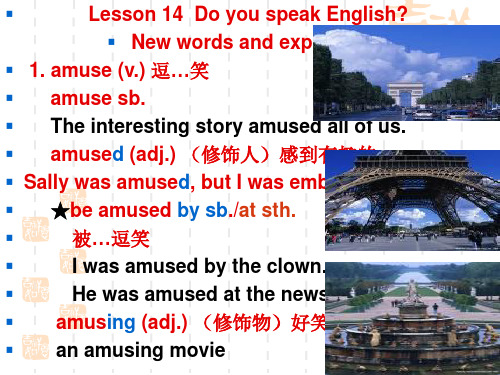
Lesson 14 Do you speak English?
▪ New words and expressions
▪ 1. amuse (v.) 逗…笑
▪ amuse sb.
▪ The interesting story amused all of us的
▪
(n.) 回复;答复
▪ I haven’t received a reply yet.
▪ 6. language (n.) 语言 ▪ ☺ native language/mother tongue ▪ ☺ a second/foreign language ▪ ☺ the English language=English ▪ ☺ language learner
▪ I had an amusing experience last year. ▪ ☺ have an experience ▪ ☺ amusing= interesting ▪ After I had left a small village in the south of
France, I drove on to the next town. ▪ ☺ in the south of France ▪ =in Southern France ▪ ☺ v.+ on 继续做… ▪ They talked on after the meeting. ▪ ☺drive on to sp. 继续开往… ▪ We drove on to London after having lunch in
▪ an amusing movie
▪ 2. experience (c.n.) 经历
▪ have an amusing/unpleasant experience
(完整版)新概念英语第二册第14课

(完整版)新概念英语第二册第14课Lesson 14 Do you speak English? 你会讲英语吗?I had an amusing experience last year. After I had left a small village in the south of France, I drove on to the next town. On the way, a young man waved to me. I stopped and he asked me for a lift. As soon as he had got into the car, I said good morning to him in French and he replied in the same language. Apart from a few words, I do not know any French at all. Neither of us spoke during the journey. I had nearly reached the town, when the young man suddenly said, very slowly, "Do you speak English?' As I soon learnt, he was English himself!'New words and expressions 生词和短语amusing adj. 好笑的,有趣的experience n. 经历wave v. 招手lift n. 搭便车reply v. 回答language n. 语言journey n. 旅行参考译文去年我有过一次有趣的经历。
在离开法国南部的一个小村庄后,我继续驶往下一个城镇。
途中,一个青年人向我招手。
我把车停下,他向我提出要求搭车。
新概念第二册第14课
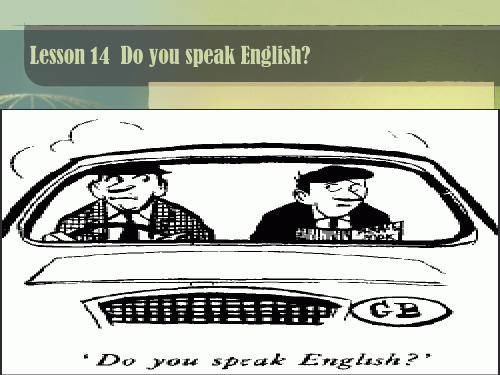
【课文讲解】
1.On the way, a young man waved to me. • on one’s way to … 在某人去某地的路上
on one’s way home 某人回家的路上
P30 on the way/ in the way /by the way/ in this way
② vt. 挥动,摇动 wave a hand at sb向某人招手 他们挥着国旗,欢迎我们。 They waved the national flag and welcomed us.
6
New Words and Expressions
wave
① v. 招手
wave to sb. 向某人招手 wave goodbye to sb.向某人挥手再见 他看见我们时,向我们挥了挥手. He waved to us when she saw us.
mother/native language the second language spoken language written language foreign language body language sign language
12
New Words a, 偏重于陆地旅行 2 hours' journey;3 days' journey(三天路 程) 去旅行 go on a journey travel / travelling n. 周游(长途旅行) trip n. 短距离旅行 (时间或距离上较短) tour n. 游玩,环游(为了玩) voyage n. 旅行(海上) flight n. 空中飞行
reply [ri'plai] v. 回答 language ['læ ŋɡwidʒ] n. 语言 journey ['dʒə:ni] n. 旅行
新概念英语第二册第十四课课后习题答案

新概念英语第二册第十四课课后习题答案Lesson141.b 根据课文第3行Istoppedandheaskedmeforalift,只有b.hewantedafreerideinthecar最符合课文内容,而其他3个选择都与课文内容不符合。
2.c 根据课文最后一句话,可以判断c.TheyeachthoughttheotherwasFrench是正确答案。
a.neitherofthemspokeFrench虽然符合课文内容,但作者并不知道搭车人也不讲法语。
b.,d.都与课文内容不符合。
3.a 本句是一般过去时形式的疑问句,需要选正确的动词形式。
B.drove不符合语法,因为已经有助动词did提问了,就不应该用过去式形式;c.driven和d.driving也不符合语法;只有a.drive最符合语法规则。
4.c 只有c.justafter可以替换前一句中的assoonas.而其他3个选择都与assoonas意思不同。
5.d只有d.said(说)最符合题目意思.a.spoke(讲某种语言,同说话,后面应有to),b.talked(谈话,谈论),c.told(讲述,告诉)这3个词的词意思都不符合题目意思和习惯用法。
6.b a.many许多,c.plentyof充足的,都不用来修饰某种语言.b.much很多,和d.alittle都可用在某种语言前面,但alittle不能用在否定句中,不可说Idon'tknowalittleFrench.所以选b.7.c只有c.bothdidn'tspeak语法正确,而其他3个选择都有语法错误,所以我们只能选c.8.b前一句中的短语ontheway是“在路上”的意思,只有b.duringthewriter’sjourney(在作者旅途中)同这个短语意思最接近,而另外3个选择都与它的意思不同。
9.c 本句需要选出与前句中的wavedto(向招手)意思相同的词。
新概念英语第二册第十四课课后习题答案.doc
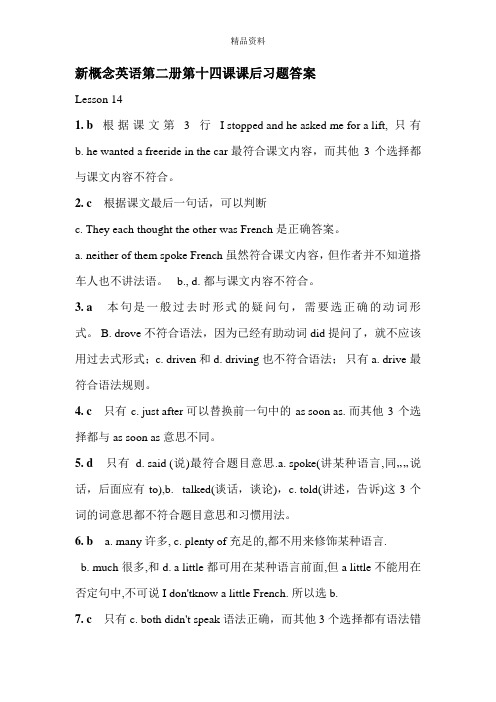
新概念英语第二册第十四课课后习题答案Lesson 141. b 根据课文第3行I stopped and he asked me for a lift, 只有b. he wanted a freeride in the car 最符合课文内容,而其他3个选择都与课文内容不符合。
2. c 根据课文最后一句话,可以判断c. They each thought the other was French 是正确答案。
a. neither of them spoke French 虽然符合课文内容,但作者并不知道搭车人也不讲法语。
b., d. 都与课文内容不符合。
3. a 本句是一般过去时形式的疑问句,需要选正确的动词形式。
B. drove 不符合语法,因为已经有助动词did提问了,就不应该用过去式形式;c. driven 和d. driving 也不符合语法;只有a. drive最符合语法规则。
4. c 只有c. just after 可以替换前一句中的as soon as. 而其他3个选择都与as soon as 意思不同。
5. d只有d. said (说)最符合题目意思.a. spoke(讲某种语言,同……说话,后面应有to),b. talked(谈话,谈论),c. told(讲述,告诉)这3个词的词意思都不符合题目意思和习惯用法。
6. b a. many 许多, c. plenty of 充足的,都不用来修饰某种语言.b. much 很多,和 d. a little 都可用在某种语言前面,但 a little 不能用在否定句中,不可说 I don'tknow a little French. 所以选b.7. c只有c. both didn't speak 语法正确,而其他3个选择都有语法错误,所以我们只能选c.8. b前一句中的短语on the way 是“在路上”的意思,只有b. during the writer’sjourney(在作者旅途中)同这个短语意思最接近,而另外3个选择都与它的意思不同。
新概念英语第二册Lesson14PPT课件

.
17
【Further notes on the text】
• 参考译文
• 去年我有过一次有趣的经历。在离开法国南部的一个 小村庄后,我继续驶往下一个城镇。途中,一个青年 人向我招手。我把车停下,他向我提出要求搭车。他 一上车,我就用法语向他问早上好,他也同样用法语 回答我。除了个别几个单词外,我根本不会法语。旅 途中我们谁也没讲话。就要到达那个镇时,那青年突 然开了口,慢慢地说道“你会讲英语吗?” 我很快了 解到,他自己就是个英国人!
⛄ journey n. 旅行 ⛄ begin a journey ⛄ go on Business/go on a trip ⛄ trip:短距离旅行或出差 ⛄ travel:周游(长途) ⛄ tour:为了玩; tourist:游客 ⛄ journey:所有的旅行 ⛄ voyage:旅行(海上); ⛄ flight:空中飞行; ⛄ journey:偏重于陆地旅行
• language n.语言 • 母语:native language(书面) • mother tongue(口语) • The native language is Chinese. • My mother tongue is Chinese.
.
11
【New words and expressions】
⛄ 到上个月底我已经在新东方学校工作六年了。
⛄ He replied that his sister had caught cold for two days. ⛄ 他回答说,他姐姐感冒已经两天了。
.
19
➢ 精讲笔记:
♚ 1.I had an amusing experience last year. ♚ 去年,我有过一次有趣的
新概念英语第二册14课_英文教案
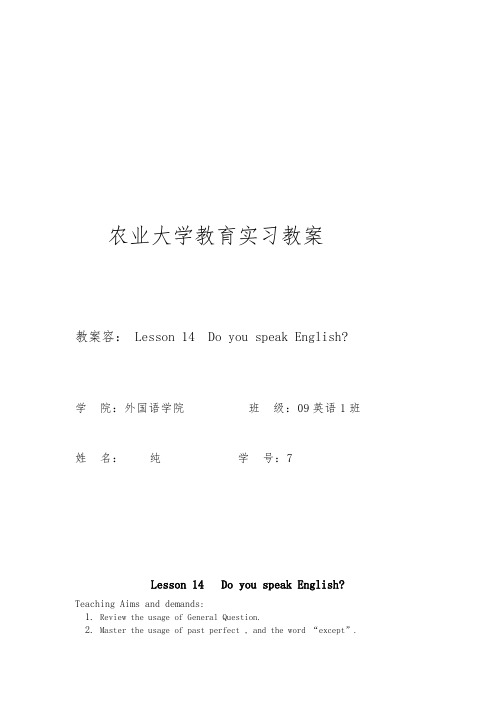
农业大学教育实习教案教案容: Lesson 14 Do you speak English? 学院:外国语学院班级:09英语1班姓名:纯学号:7Lesson 14 Do you speak English?Teaching Aims and demands:1.Review the usage of General Question.2.Master the usage of past perfect , and the word “except”.3.Grasp the following words and phrases: amusing, experience, village, wave,lift, reply, reach, language, journey, drive on to, wave to sb., ask for a lift, apart from, neither of , not at all, on the way, as soon as.4.Learn a kind of word—adverb “-ly”.5.Practice oral English with the topic “An amusing experience you have atshool”.Teaching Content: Text ; Exercises (from Vocabulary to Writing)Teaching Key points and difficult points:1.the usage of past perfect.2.amusing, experience, ask for a lift, apart from, on the wayTeaching Periods: 6 periodsTeaching Procedures:Period 1-2:Ⅰ. Introduction to the text by asking some questions.Questions:1.Do you remember the first English word you can speak? “Yes”“No”?2.Do you think speaking English is difficult? Why?3.Who is the first person you spoke to in English? Your teacher or yourclassmate?4.What did you talk about when you spoke English at the first time?5.How many years have you been learning English?6.How do you think your oral English now?7.Do you often make mistakes when you speak English? What are they?8.Have you ever talked with foreigners in English? When and where?9.Do you know how to greet when you meet foreigners?10.Can you recognize a person who is an English or French?Ⅱ.Ask students to go through the text and finish the pre-class work to get the main idea of the text. Then analyze the text the general idea .Ⅲ. Explain the text in details.1. amusing adj. causing laughter or smiles; enjoyable; funny and entertaininge.g. * an amusing story/anecdote/incident* Our visits to the theatre made the holiday more amusing.a highly amusing (=very amusing) filmmildly/vaguely amusing (=a little amusing , but not very )a mildly amusing spectacle-amusingly adv.※Amusing/amusedAmused adj.e.g. If you are amused by something, you think it is funny and you smile or laugh..amused at / byEllen seemed amused by the whole situation.I could see she was highly amused (=very amused).The man looked a little amused.He won’t be very amused (=he will be annoyed) when he finds out what’s happened to his garden.An amused smile / look / expressionKeep sb. amused -to entertain or interest someone for a long time so that they do not get borede.g. There were puzzles and games to keep the children amused.2. experience /ɪk'spɪərɪəns; ɪk`spɪrɪəns/ n.1). [U] (process of gaining) knowledge or skill acquired from seeing and doing things 经验; 体验e.g. *We all learn by experience.* Does she have much experience of teaching?* He hasn't had enough work experience (ie experience of work) for the job.* I know from experience that he'll arrive late.2). [C] event or activity that affects one in some way; event or activity that has given one experience 经历; 阅历; 感受; 体会*an unpleasant, a trying, an unusual, etc experience* You must try some of her home-made wine it's quite an experience! ie it's very unusual.* He had many interesting experiences while travelling in Africa.3).experience v.[Tn] have experience of (sth); feel 有(某事物)的经验; 经历; 感觉; 感受; 体验 e.g. *experience pleasure, pain, difficulty, great hardships, etc 体验到愉快、痛苦、困难、苦难等* The child had never experienced kindness..* I don't think I've ever experienced real depression.4).experienced adj. having experience; having knowledge or skill as a result of experience 有经验的; 有阅历的; 有见识的; 熟练的*an experienced nurse* He's experienced in looking after children.3. village n. a very small town in the countrysidea little fishing villagevillage school / shop / churchthe villagen. the people who live in a villagee.g. The whole village came to the meeting.4. After I had left a small village in the south of France, I drove on to the next town.As soon as he had got into the car, I said good morning to him in French and he replied in the same language.I had nearly reached the town, when the young man suddenly said, very slowly, ‘Do you speak English?’﹡Drive on to the next town: continually drive the car to the next townOn: continually; no stopping﹡As soon as: once; on condition that﹡Reply v. give one’s ansers; respondReply to :He did not reply to her question right away.﹡Had left/had got into/had reached: had done →past perfect tense:usually means two actions happened in the past,one of which happened before the other.e.g. He finished work. He went home. (We can join these two sentences together with the word after)We can say: After he had finished work he went home.◆Note how these sentences have been joined. Pay close attention to the words in italics.a.The children ran away. They broke the window.→The children ran away after they had broken the window.b.The sun set. We returned to our hotel.→As soon as the sun had set we returned to our hotel.c.He finished lunch. He asked for a glass of water.→When he had finished lunch he asked for a glass of water.d.I did not understand the problem. He explained it.→I had not understood the problem until he explained it.5. Word formation-----affixationAdv. –ly(the suffix –ly ,from Middle English, is added to adjectives to form adverbs.)Noun adj. Adv.Suddenness sudden suddenlySlowness slow slowlyQuickness quick quicklyNotice: -ness is add to adjectives to form nouns.6. on the way: on a route to some placee.g. I met an old friend on the way to work this morning.Go right home at once, don’t stop off anywhere on the way.I unluckily had a flat tire on the way here.7. wave to sb.: make a signal with the handse.g. She waved to her friendsJessica caught sight of Lois and waved to her.8. ask sb. for a lift: ask sb. to drive him/her for a distancee.g. I lent him his bus fare and then he had the brass neck to ask me for a lift home.9. apart from: except; except for ; besidese.g. Apart from some spelling mistakes, the composition is fairly good.I have nothing more to ask you about apart from these questions.Apart from that, all goes well.*Except / except for / besides(Besides is used to emphasize an additional point that you are making, especially one that you consider to be important.)e.g. I wouldn't have accepted anything except a job in Europe.I don't take any drugs whatsoever, except aspirin for coldsYour composition is good except for the spelling mistakes. (=apart from)Everything is satisfactory except for the light.The house was too expensive and too big. Besides, I'd grown fond of our little rented house.•Usage Note:Do not confuse besides, except, except for, and unless. You use besides to introduce extra things in addition to the ones you are mentioning already.Fruit will give you, besides enjoyment, a source of vitamins. However, note that if you talk about 'the only thing' or 'the only person' besides a particular person or thing, besides means the same as 'apart from'. He was the only person besides Gertrude who talked to Guy. You use except to introduce the only things, situations, people, or ideas that a statement does not apply to. All of his body relaxed except his right hand... Travelling was impossible, except in the cool of the morning. You use except for before something that prevents a statement from being completely true. The classrooms were silent, except for the scratching of pens on paper... I had absolutely no friends except for Tom.Unless is used to introduce the only situation in which something will take place or be true.In the 1940s, unless she wore gloves a woman was not properly dressed... You must not give compliments unless you mean them.10. not at all : in no way; to be far from; not a bit ; not nearly / it doesn’t mattere.g. The pilots respectfully represented that they were not at all tired. Such attitudes were not at all uncommon thirty years ago.It's not at all certain whether I'll come tomorrow.His illness is not at all serious.11. neither of : both don’te.g. Neither of you believes one word that you are saying.I know neither of them.Neither of my parents is a teacher.Neither / nore.g. He does not like that doll . Neither ( nor ) do you.They are not going to learn Russian. Neither ( nor ) are we.Neither…nor / either…ore.g. Neither volleyball nor basketball is what she likes..It is neither hot nor cold in winter.You cannot have it both ways. You must either stay home or come with us.Every Sunday, they relax themselves either in the parks or in the mountains.★Which of ,either of , neither of ,both of, neither of …we use these words when we refer to two persons or things.Which of the two do you want?Either of them will do.I like neither of them.I bought both of them.12. reach: arrive at/in; get to / catch / touche.g. The book's too high -- I can't reach it.He who doesn't reach the Great Wall is not a true man.reach an agreementIt is very important to reach an agreement with this big company.13. Do you speak English? (a general question) auxiliaries+subject+verb+…Answer such questions: yes/no.e.g.. Are you a student?----Yes, I am./No, I’m not.Can you write it down?----Yes, I can./No, I can’t.May I ask you some questions?----Yes, please.Period 3-4Ⅳ. Do some oral practice.1.Ask students to retell the story based on the following questions by using theexpressions in the text.Questions concerned:a.Whom did the writer give a lift to in the south of France last year?b.Did they greet each other in English or in French?c.Does the writer speak any French or not?d.Did they sit in silence, or did they talk to each other?e.What did the young man say at the end of the journey?f.Was he English himself, or was he French?2.Topic: My amusing experience at primary schoolExpressions for reference:(surroundings, campus, dormitory, roommates, classmates, teachers, class, subjects,etc.)(unforgettable, amusing, surprised, vivid, various, colorful etc.)Ⅴ. WritingAsk students to write a summary about this text in not more than 55 words.Ⅵ. ConclusionAsk some students to read their summaries and evaluate the best one. Analyze the reasons why his/hers is the excellent.(talk about the skills)Period 5-6Ⅶ. Do some exercises in class and check the answers.1. These question are about the passage. Write a complete sentence in answer to each question.a. When did you drive on to the next town?b. When did you say gook morning to him in French?c. When did the young man say ‘Do you speak English?’?2. Join these sentences together. Do not refer to the passage until you finish the exercise.a. I left a small village in the south of France. I drove on to the next down.b. He got into the car. I said gook morning to him in French.c. I nearly reached the town. The young man said. ‘Do you speak English ?’3. Join these pairs of sentences with the words given in parentheses.a. (after) She wrote the letter. She went to the post office.b. (after) He hab dinner. He went to the cinema.c. (when) I fastened my seat belt. The plane took off.d. We did not disturb him. (until) He finished work.e. (as soon as) He left the room. I turned on the radio.f. He was very ill. (before) He died.4. Give the correct form of the verbs in parentheses.a. The moment he had said this, he (regret) it.b. It (begin) to rain before she took a taxi.c. When all the guests had left, Derek (arrive).Ⅷ. Do the exercises in the book, then ask student to check the answers. Explain the key points.A slight headache a bit too longAsk/ask for recognizeA free ride drive/drove/drivenMany/much/plenty of just asⅨ. Assignments :1. NCE Grammar Practice2 P48-522. Writing: How to speak English well?。
新概念英语第二册14课课文

新概念英语第二册14课课文新概念英语第二册14课课文一、课文原文It was Joe's first date with Mary. He asked her what she wanted in life and she replied, "I want to establish my career. That's the most important thing to me right now." Undeterred, Joe pursued his line of questioning. "Do you want to marry and have children?" he asked. Mary replied, "I do, but not now. In a few years, maybe." Joe asked, "What would you do if you met the man of your dreams?" Mary smiled and answered, "I'd be sure he was the man of my dreams before I committed myself. I'd want to be very sure thathe was really the right person for me. I wouldn't want to make a mistake." "Well," said Joe, "I think you've just described what a marriage is. It's making a commitment and being sure that you've found the right person."二、课文翻译约瑟夫第一次与玛丽约会。
(完整版)新概念英语第二册:第14课课文详解及语法解析

新概念英语第二册:第14课课文详解及语法解析课文详注 Further notes on the text1.After I had left a small village in the south of France, I drove on to the next town.在离开法国南部的一个小村庄后,我继续驶往下一个城镇。
(1)表示一个大范围中的某一个地方时要用介词in:Beijing is in the north of China.北京位于中国的北部。
(2)副词on紧跟在动词后面时能够表示“向前”、“继续下去”等意义:He talked on until everybody had gone.他滔滔不绝地讲到大家都走了。
I was reading when my friend called. After he had gone,I went on to read.我朋友来看我时我正在看书。
他走了以后我便继续看书。
2.I stopped and he asked me for a lift.我把车停下,他向我提出要求搭车。
名词lift的含义之一是“(给步行者)搭便车”、“免费搭车”:Last night, I had to walk home. No one would give me a lift.昨晚我不得不走回家。
谁也不愿意让我搭车。
I was lucky today. I got a lift soon after I had leftthe village.我今天运气好,离开村子不久就搭上了便车。
3.As soon as he had got into the car, I said goodmorning to him in French and he replied in the same language.他一上车,我就用法语向他问早上好,他也同样用法语回答我。
(1)表示时间的固定短语as soon as通常表示“一……就……”,即两个动词之间相隔时间非常短:Tell him the news as soon as you meet him.你一遇见他就把这消息告诉他。
新概念英语第二册课件Lesson14(共35页)

Passage analysis
• After I had left a small village in the south of France, I drove on to the next town.
• drove on 继续开车 • on 加在动词的后面表示继续 • Eg: My heart will go on. 《我心永恒》
• In the way 挡路
• He tried to get to the door, but the table was in the way.
• 他试图走近大门,可是桌子挡住了去路。 • By the way 顺便说
• By the way, how is your mother? • 顺便问一下,你妈妈怎么样?
Lesson 14
Review
• 将来进行时态 • 结构: • will be doing • 意义: • 将来进行的事情
Review
• 我们将在花园里干活。 • We shall /will be working in the garden. • 他们今晚就走。 • They will be leaving this evening.
• 1. as soon as 一… 就 • 我一到北京就给你打电话。
• As soon as I arrive in Beijing, I will call you.
• 我一到家就给你打电话。
• As soon as I get home, I will call you.
• 我一遇见他就非常喜欢他。
Warm-up questions
• 1. What do you think is happening in the picture?
(完整版)新概念英语第二册第14课
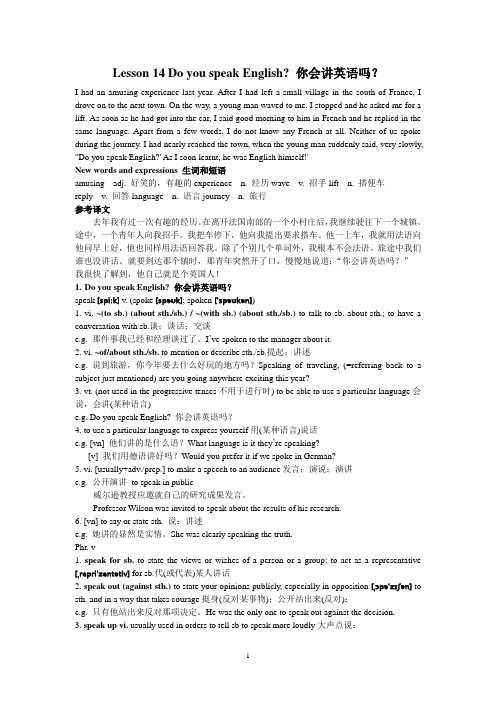
Lesson 14 Do you speak English? 你会讲英语吗?I had an amusing experience last year. After I had left a small village in the south of France, I drove on to the next town. On the way, a young man waved to me. I stopped and he asked me for a lift. As soon as he had got into the car, I said good morning to him in French and he replied in the same language. Apart from a few words, I do not know any French at all. Neither of us spoke during the journey. I had nearly reached the town, when the young man suddenly said, very slowly, "Do you speak English?' As I soon learnt, he was English himself!'New words and expressions 生词和短语amusing adj. 好笑的,有趣的experience n. 经历wave v. 招手lift n. 搭便车reply v. 回答language n. 语言journey n. 旅行参考译文去年我有过一次有趣的经历。
在离开法国南部的一个小村庄后,我继续驶往下一个城镇。
途中,一个青年人向我招手。
我把车停下,他向我提出要求搭车。
他一上车,我就用法语向他问早上好,他也同样用法语回答我。
新概念英语第二册第14课课文讲解

【New words and expressions】amusing [?‘mju:zi?]adj. 好笑的,有趣的experience [iks’pi?ri?ns] n. 经历wave [weiv] v. 招手lift [lift] n. 搭便车reply [ri'plai] v. 回答language ['l??ɡwid?] n. 语言journey ['d??:ni] n. 旅行1. amusing adj. 令人发笑的The story is amusing. (好笑的)amused adj. 感到好笑的I am amused.amuse v. 使发笑,使愉快The story amuses me.funny adj. 好笑的(不一定要笑出声可以指贬义),开心的,令人开心的interesting / funny story类似词语:excite 令人兴奋exciting excitedinterest 令人感兴趣interesting interestedThe exciting news made us excited.The book is interesting and we are interested in it.2. experience①n. 经历(可数)an unusual experienceHe has a lot of experiences.②n. 经验,体验(不可数)She has a lot of teaching experience.③vt. 经验,体验Ganzhou has experienced great changes.experienced adj. 有经验的,经验丰富的He is an experienced doctor.inexperienced 无经验的,不熟练的eg. He is inexperienced in looking after children 3.wave v. 招手wave to sb. 向某人招手4. lift1) Vt.举起,抬起eg. The box is too heavy ;I can’t lift it.2)vi. (雾、云)消散,(雨、雪)停止Eg. The fog has lifted.3) n. 电梯elevator (Am)4) n. 搭便车give sb a lift 让某人搭便车5. reply v. 答复;回答reply to = answer 回应;回答answer my questionreply to my question我会给你回信的。
新概念英语第二册第14课 do you speak English你会说英语吗
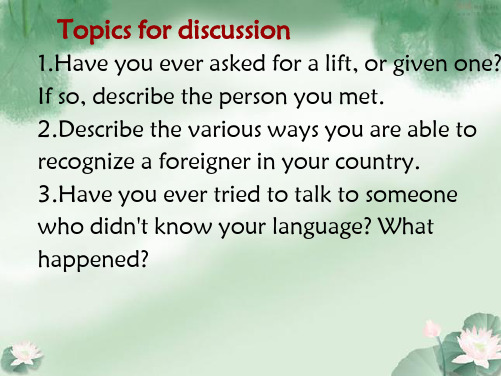
More questions on the text
1. Whom did the writer give a lift to in the south of France last year?
wave to sb. 向…挥手
I waved goodbye (hello) to him.
【课文讲解】
2. I stopped and he asked me for a lift.
lift n. 搭便车
take a bus/taxi/lift
乘公共汽车/乘出租汽车/搭便车
ask sb. for a lift (ride) (向某人)要求搭便车 give sb. a lift (ride) 让某人搭便车
除了个别几个单词外,我根本不 会法语。旅途中我们谁也没讲话。 (15分)
Apart from a few words, I do not know any French at all.Neither of us spoke during the journey.
reply [ri'plai] v. 回答 language ['læ ŋɡwidʒ] n. 语言 journey ['dʒə:ni] n. 旅行
Listen & Answer
1. What happened when the writer was driving to a town in France?
They are the same.
【课文讲解】
表达方位的表达方式一共有3个介词, in(在……里面), on(接壤), to(没有相接的, 是相离的) A is in the east of B A在B的东方(A在B的里面) A is on the east of B A在B的东方(A与B接壤) A is to the east of B A在B的东方(A与B不相接)
新概念英语2第14课 NCE2_Lesson14
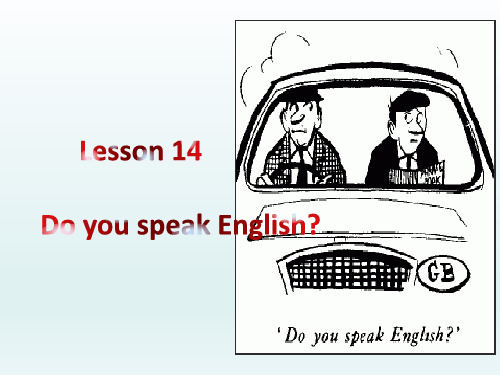
window. • 句式: • ①肯定句:主语+had+过去分词+其他 • They had broken the window. • ②否定句:主语+had+not+过去分词+其他 • They hadn't broken the window.
Did you talk to them?
amusing experience wave lift apart from reply language journey reach
a. 有趣的 n. 经验,体验 v. 挥手 n.搭便车 除…以外 n. 回答 n. 语言 n. 旅行 v. 到达
★amusing adj. 好笑的,有趣的
★Journey n. 旅行
• Journey : 长途旅行 • trip:短距离旅行或出差 Journey to the West
Listen to the story and answer questions
• 1.Whom did the writer give a lift to in the south of France last year.
job. (经验,不可数名词) • Does she have any experience in teaching? • ③ vt. 经验,体验 • Have you ever experienced anything like this?
• The vies since 1980.
• 正如我告诉过你的,我对流行音乐感兴趣。
新概念英语第二册第十四课

新概念英语第二册第十四课Lesson 14 An exciting tripThe train for Glasgow leaves from platform 3. At what time does it leave?Excuse me, is this platform 3?Yes, that's right.What time does the train for Glasgow leave?It leaves at 10:30. You've got about ten minutes.Thank you.Are you going to Glasgow?No, I'm going to Edinburgh.Oh, so am I.Are you?Yes. We can travel together, if you like.That's a good idea. Perhaps we can sit together on the train.There's a good restaurant car on this train.Is there?Yes. We'll be able to have lunch on the train.That's great. I'm looking forward to that.We had a very good lunch on the train.Yes, we did. It was a very good idea to have lunch on the train.It's certainly better than having lunch at a station.The scenery is very beautiful, isn't it?Yes, it is. It's very different from the scenery in the south.We arrived in Edinburgh at two thirty.Thank you for travelling with British Rail. Goodbye. Goodbye. It was a very good trip.。
新概念第二册第14课课文讲解

Lesson 14 Do you speak EnglishI had an amusing experience last year. After I had left a small village in the south of France, I drove on to the next town. On the way, a young man waved to me. I stopped and he asked me for a lift. As soon as he had got into the car, I said good morning to him in French and he replied in the same language. Apart from a few words, I do not know any French at all. Neither of us spoke during the journey. I had nearly reached the town, when the young man suddenly said, very slowly, "Do you speak English' As I soon learnt, he was English himself!'参考译文去年我有过一次有趣的经历。
在离开法国南部的一个小村庄后,我继续驶往下一个城镇。
途中,一个青年人向我招手。
我把车停下,他向我提出要求搭车。
他一上车,我就用法语向他问早上好,他也同样用法语回答我。
除了个别几个单词外,我根本不会法语。
旅途中我们谁也没讲话。
就要到达那个镇时,那青年突然开了口,慢慢地说道:“你会讲英语吗”我很快了解到,他自己就是个英国人!【New words and expressions】生词和短语★amusing adj. 好笑的,有趣的amused:感到好笑的amuse v.动词后面会加人做宾语The story amused me.The story is amusing.I am amused.interesting:有意思The book is interesting.The book is amusing.funny:好笑的,可以指贬义,开心的,令人开心的interesting/funny story★experience n. 经历经验、体验:不可数名词经历、感受:可数名词He has a lot of experience. He has a lot of experiences.Experience is the best teacher. 经验是最好的老师。
新概念英语第二册Lesson 14
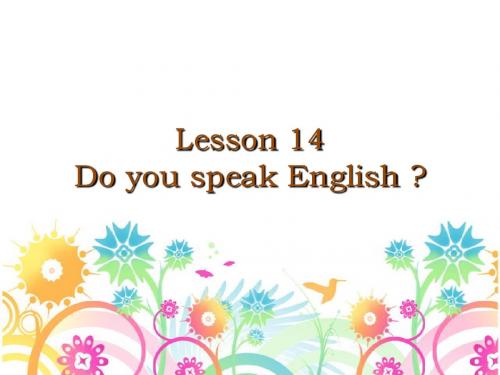
Listen to the passage for the 2nd time and finish the questions:
• 1. I had an amusing experience ________. • A. last month B. last year C. yesterday • 2. On the way, a young man _______ me. I stopped and he asked me for a lift. • A. smiled to B.waved to C. called • 3. I had nearly _____ the town,when the young man suddenly said, ‘Do you speak English?’ • A. left B. seen C. reached
【课文讲解】
2. I stopped and he asked me for a lift.
• • • • )ask for 要,要求(某样东西)
ask for the answer 要答案
我要了一杯茶
I asked for a cup of tea。
• 你经常寻求帮助。 • You are always asking for help.
• 1、After I had left a small village in the south of France, I drove on to the next town. • • • • • drive on 继续开往 My heart will go on. 《我心永恒》 drive to 开车去某地 He talked on until everybody had gone. 他滔滔不绝地讲到大家都走了。
新概念二册第14课

Lesson 14 Do you speak English?你会讲英语吗?单词学习amusing adj. 好笑的,有趣的英文解释:enjoyable, causing laughter or smilesamuse [ə'mju:z] v.令人好笑的英文解释: make sb laugh or smileEveryone was amused at the cute boy. 大家都被这个可爱的孩子逗乐了。
or: Everyone was amused by the cute boy.The amusing story amused the children. 这个好笑的故事把孩子们都逗乐了。
be amused at/by 因…感到好笑be amused to do sth 做…取乐amusement [ə'mjuːzm(ə)nt] n. 娱乐,消遣 [U]She looked at me in amusement. 她饶有趣味地看着我。
experience [iks'piəriəns] 1) n. 经历,阅历 [C]an amusing experience 一次好笑的经历an unpleasant experience 一次不愉快的经历an unusual experience 一次不同寻常的经历He had many amusing experiences while traveling in France.当他在法国旅行时,有过许多有趣的经历。
You must try some of her home-made wine. It's quite an experience. 你一定要尝尝她家自酿的酒,那真是一饱口福啊。
2) n. 经验 [U]He hasn't had enough work experience. 他没有足够的工作经验。
I know from experience that he will arrive late.我从经验得出,他一定会迟到的。
新概念英语第二册14课_英文教案

湖南农业大学教育实习教案教案内容: Lesson 14 Do you speak English? 学院:外国语学院班级:09英语1班姓名:赵纯学号:200941327117Lesson 14 Do you speak English?Teaching Aims and demands:1.Review the usage of General Question.2.Master the usage of past perfect , and the word “except”.3.Grasp the following words and phrases: amusing, experience, village, wave,lift, reply, reach, language, journey, drive on to, wave to sb., ask for a lift, apart from, neither of , not at all, on the way, as soon as.4.Learn a kind of word—adverb “-ly”.5.Practice oral English with the topic “An amusing experience you have atshool”.Teaching Content: Text ; Exercises (from Vocabulary to Writing)Teaching Key points and difficult points:1.the usage of past perfect.2.amusing, experience, ask for a lift, apart from, on the wayTeaching Periods: 6 periodsTeaching Procedures:Period 1-2:Ⅰ. Introduction to the text by asking some questions.Questions:1.Do you remember the first English word you can speak? “Yes”“No”?2.Do you think speaking English is difficult? Why?3.Who is the first person you spoke to in English? Your teacher or yourclassmate?4.What did you talk about when you spoke English at the first time?5.How many years have you been learning English?6.How do you think your oral English now?7.Do you often make mistakes when you speak English? What are they?8.Have you ever talked with foreigners in English? When and where?9.Do you know how to greet when you meet foreigners?10.Can you recognize a person who is an English or French?Ⅱ.Ask students to go through the text and finish the pre-class work to get the main idea of the text. Then analyze the text the general idea .Ⅲ. Explain the text in details.1. amusing adj. causing laughter or smiles; enjoyable; funny and entertaininge.g. * an amusing story/anecdote/incident* Our visits to the theatre made the holiday more amusing.a highly amusing (=very amusing) filmmildly/vaguely amusing (=a little amusing , but not very )a mildly amusing spectacle-amusingly adv.※Amusing/amusedAmused adj.e.g. If you are amused by something, you think it is funny and you smile or laugh..amused at / byEllen seemed amused by the whole situation.I could see she was highly amused (=very amused).The man looked a little amused.He won’t be very amused (=he will be annoyed) when he finds out what’s happened to his garden.An amused smile / look / expressionKeep sb. amused -to entertain or interest someone for a long time so that they do not get borede.g. There were puzzles and games to keep the children amused.2. experience /ɪk'spɪərɪəns; ɪk`spɪrɪəns/ n.1). [U] (process of gaining) knowledge or skill acquired from seeing and doing things 经验; 体验e.g. *We all learn by experience.* Does she have much experience of teaching?* He hasn't had enough work experience (ie experience of work) for the job.* I know from experience that he'll arrive late.2). [C] event or activity that affects one in some way; event or activity that has given one experience 经历; 阅历; 感受; 体会*an unpleasant, a trying, an unusual, etc experience* You must try some of her home-made wine it's quite an experience! ie it's very unusual.* He had many interesting experiences while travelling in Africa.3).experience v.[Tn] have experience of (sth); feel 有(某事物)的经验; 经历; 感觉; 感受; 体验 e.g. *experience pleasure, pain, difficulty, great hardships, etc 体验到愉快、痛苦、困难、苦难等* The child had never experienced kindness..* I don't think I've ever experienced real depression.4).experienced adj. having experience; having knowledge or skill as a result of experience 有经验的; 有阅历的; 有见识的; 熟练的*an experienced nurse* He's experienced in looking after children.3. village n. a very small town in the countrysidea little fishing villagevillage school / shop / churchthe villagen. the people who live in a villagee.g. The whole village came to the meeting.4. After I had left a small village in the south of France, I drove on to the next town.As soon as he had got into the car, I said good morning to him in French and he replied in the same language.I had nearly reached the town, when the young man suddenly said, very slowly, ‘Do you speak English?’﹡Drive on to the next town: continually drive the car to the next townOn: continually; no stopping﹡As soon as: once; on condition that﹡Reply v. give one’s ansers; respondReply to :He did not reply to her question right away.﹡Had left/had got into/had reached: had done →past perfect tense:usually means two actions happened in the past,one of which happened before the other.e.g. He finished work. He went home. (We can join these two sentences together with the word after)We can say: After he had finished work he went home.◆Note how these sentences have been joined. Pay close attention to the words in italics.a.The children ran away. They broke the window.→The children ran away after they had broken the window.b.The sun set. We returned to our hotel.→As soon as the sun had set we returned to our hotel.c.He finished lunch. He asked for a glass of water.→When he had finished lunch he asked for a glass of water.d.I did not understand the problem. He explained it.→I had not understood the problem until he explained it.5. Word formation-----affixationAdv. –ly(the suffix –ly ,from Middle English, is added to adjectives to form adverbs.)Noun adj. Adv.Suddenness sudden suddenlySlowness slow slowlyQuickness quick quicklyNotice: -ness is add to adjectives to form nouns.6. on the way: on a route to some placee.g. I met an old friend on the way to work this morning.Go right home at once, don’t stop off anywhere on the way.I unluckily had a flat tire on the way here.7. wave to sb.: make a signal with the handse.g. She waved to her friendsJessica caught sight of Lois and waved to her.8. ask sb. for a lift: ask sb. to drive him/her for a distancee.g. I lent him his bus fare and then he had the brass neck to ask me for a lift home.9. apart from: except; except for ; besidese.g. Apart from some spelling mistakes, the composition is fairly good.I have nothing more to ask you about apart from these questions.Apart from that, all goes well.*Except / except for / besides(Besides is used to emphasize an additional point that you are making, especially one that you consider to be important.)e.g. I wouldn't have accepted anything except a job in Europe.I don't take any drugs whatsoever, except aspirin for coldsYour composition is good except for the spelling mistakes. (=apart from)Everything is satisfactory except for the light.The house was too expensive and too big. Besides, I'd grown fond of our little rented house.•Usage Note:Do not confuse besides, except, except for, and unless. You use besides to introduce extra things in addition to the ones you are mentioning already.Fruit will give you, besides enjoyment, a source of vitamins. However, note that if you talk about 'the only thing' or 'the only person' besides a particular person or thing, besides means the same as 'apart from'. He was the only person besides Gertrude who talked to Guy. You use except to introduce the only things, situations, people, or ideas that a statement does not apply to. All of his body relaxed except his right hand... Travelling was impossible, except in the cool of the morning. You use except for before something that prevents a statement from being completely true. The classrooms were silent, except for the scratching of pens on paper... I had absolutely no friends except for Tom.Unless is used to introduce the only situation in which something will take place or be true.In the 1940s, unless she wore gloves a woman was not properly dressed... You must not give compliments unless you mean them.10. not at all : in no way; to be far from; not a bit ; not nearly / it doesn’t mattere.g. The pilots respectfully represented that they were not at all tired. Such attitudes were not at all uncommon thirty years ago.It's not at all certain whether I'll come tomorrow.His illness is not at all serious.11. neither of : both don’te.g. Neither of you believes one word that you are saying.I know neither of them.Neither of my parents is a teacher.Neither / nore.g. He does not like that doll . Neither ( nor ) do you.They are not going to learn Russian. Neither ( nor ) are we.Neither…nor / either…ore.g. Neither volleyball nor basketball is what she likes..It is neither hot nor cold in winter.You cannot have it both ways. You must either stay home or come with us.Every Sunday, they relax themselves either in the parks or in the mountains.★Which of ,either of , neither of ,both of, neither of …we use these words when we refer to two persons or things.Which of the two do you want?Either of them will do.I like neither of them.I bought both of them.12. reach: arrive at/in; get to / catch / touche.g. The book's too high -- I can't reach it.He who doesn't reach the Great Wall is not a true man.reach an agreementIt is very important to reach an agreement with this big company.13. Do you speak English? (a general question) auxiliaries+subject+verb+…Answer such questions: yes/no.e.g.. Are you a student?----Yes, I am./No, I’m not.Can you write it down?----Yes, I can./No, I can’t.May I ask you some questions?----Yes, please.Period 3-4Ⅳ. Do some oral practice.1.Ask students to retell the story based on the following questions by using theexpressions in the text.Questions concerned:a.Whom did the writer give a lift to in the south of France last year?b.Did they greet each other in English or in French?c.Does the writer speak any French or not?d.Did they sit in silence, or did they talk to each other?e.What did the young man say at the end of the journey?f.Was he English himself, or was he French?2.Topic: My amusing experience at primary schoolExpressions for reference:(surroundings, campus, dormitory, roommates, classmates, teachers, class, subjects,etc.)(unforgettable, amusing, surprised, vivid, various, colorful etc.)Ⅴ. WritingAsk students to write a summary about this text in not more than 55 words.Ⅵ. ConclusionAsk some students to read their summaries and evaluate the best one. Analyze the reasons why his/hers is the excellent.(talk about the skills)Period 5-6Ⅶ. Do some exercises in class and check the answers.1. These question are about the passage. Write a complete sentence in answer to each question.a. When did you drive on to the next town?b. When did you say gook morning to him in French?c. When did the young man say ‘Do you speak English?’?2. Join these sentences together. Do not refer to the passage until you finish the exercise.a. I left a small village in the south of France. I drove on to the next down.b. He got into the car. I said gook morning to him in French.c. I nearly reached the town. The young man said. ‘Do you speak English ?’3. Join these pairs of sentences with the words given in parentheses.a. (after) She wrote the letter. She went to the post office.b. (after) He hab dinner. He went to the cinema.c. (when) I fastened my seat belt. The plane took off.d. We did not disturb him. (until) He finished work.e. (as soon as) He left the room. I turned on the radio.f. He was very ill. (before) He died.4. Give the correct form of the verbs in parentheses.a. The moment he had said this, he (regret) it.b. It (begin) to rain before she took a taxi.c. When all the guests had left, Derek (arrive).Ⅷ. Do the exercises in the book, then ask student to check the answers. Explain the key points.A slight headache a bit too longAsk/ask for recognizeA free ride drive/drove/drivenMany/much/plenty of just asⅨ. Assignments :1. NCE Grammar Practice2 P48-522. Writing: How to speak English well?。
- 1、下载文档前请自行甄别文档内容的完整性,平台不提供额外的编辑、内容补充、找答案等附加服务。
- 2、"仅部分预览"的文档,不可在线预览部分如存在完整性等问题,可反馈申请退款(可完整预览的文档不适用该条件!)。
- 3、如文档侵犯您的权益,请联系客服反馈,我们会尽快为您处理(人工客服工作时间:9:00-18:30)。
Lesson 14 Do you speak English? 你会讲英语吗?I had an amusing experience last year. After I had left a small village in the south of France, I drove on to the next town. On the way, a young man waved to me. I stopped and he asked me for a lift. As soon as he had got into the car, I said good morning to him in French and he replied in the same language. Apart from a few words, I do not know any French at all. Neither of us spoke during the journey. I had nearly reached the town, when the young man suddenly said, very slowly, "Do you speak English?' As I soon learnt, he was English himself!'New words and expressions 生词和短语amusing adj. 好笑的,有趣的experience n. 经历wave v. 招手lift n. 搭便车reply v. 回答language n. 语言journey n. 旅行参考译文去年我有过一次有趣的经历。
在离开法国南部的一个小村庄后,我继续驶往下一个城镇。
途中,一个青年人向我招手。
我把车停下,他向我提出要求搭车。
他一上车,我就用法语向他问早上好,他也同样用法语回答我。
除了个别几个单词外,我根本不会法语。
旅途中我们谁也没讲话。
就要到达那个镇时,那青年突然开了口,慢慢地说道:“你会讲英语吗?”我很快了解到,他自己就是个英国人!1.Do you speak English? 你会讲英语吗?speak[spi:k]v. (spoke[spəʊk]; spoken[ˈspəʊkən])1. vi. ~(to sb.) (about sth./sb.) / ~(with sb.) (about sth./sb.) to talk to sb. about sth.; to have a conversation with sb.谈;谈话;交谈e.g. 那件事我已经和经理谈过了。
I’ve spoken to the manager about it.2. vi. ~of/about sth./sb. to mention or describe sth./sb.提起;讲述e.g. 说到旅游,你今年要去什么好玩的地方吗?Speaking of traveling, (=referring back to a subject just mentioned) are you going anywhere exciting this year?3. vt. (not used in the progressive tenses不用于进行时) to be able to use a particular language会说,会讲(某种语言)e.g. Do you speak English? 你会讲英语吗?4. to use a particular language to express yourself用(某种语言)说话e.g. [vn] 他们讲的是什么语?What language is it they’re speaking?[v] 我们用德语讲好吗?Would you prefer it if we spoke in German?5. vi. [usually+adv./prep.] to make a speech to an audience发言;演说;演讲e.g. 公开演讲to speak in public威尔逊教授应邀就自己的研究成果发言。
Professor Wilson was invited to speak about the results of his research.6. [vn] to say or state sth. 说;讲述e.g. 她讲的显然是实情。
She was clearly speaking the truth.Phr. v1. speak for sb.to state the views or wishes of a person or a group; to act as a representative [ˌrepriˈzentətiv] for sb.代(或代表)某人讲话2. speak out (against sth.) to state your opinions publicly, especially in opposition [ˌɔpəˈzɪʃən] to sth. and in a way that takes courage挺身(反对某事物);公开站出来(反对):e.g. 只有他站出来反对那项决定。
He was the only one to speak out against the decision.3. speak up vi. usually used in orders to tell sb to speak more loudly大声点说:e.g. 请大点声讲------我们在后面听不见。
Please speak up---we can’t hear you at the back. speaker n.1. a person who gives a talk or makes a speech 发言者;演讲者2. a person who is or was speaking说话者3. a person who speaks a particular language 讲(某种语言)的人e.g. 以英语为母语的人native speakers of English4. (the) Speaker the title of a person whose job is to control the discussions in a parliament(议会的)议长e.g. 英国下议院议长the Speaker of the House of Commons [ˈkɔmən]5.扬声器;喇叭2. I had an amusing experience last year. 去年我有过一次有趣的经历。
1) amusing [əˈmju:ziŋ] adj. funny and enjoyable逗人笑的;有乐趣的;好笑的adv. amusinglye.g. 逗人笑的故事/游戏an amusing story/game她写的信十分有趣。
She writes very amusing letters.amused [əˈmju:zd] adj. ~(at/by sth) / ~(to see, find, learn, etc.) thinking that sb./sth. is funny, so that you smile or laugh 逗乐的;觉得好笑的:e.g. 我们都被他的故事逗笑了。
We were all amused at his stories.他看见她玩这个游戏十分认真的样子,觉得好笑。
He was amused to see how seriously she took the game.IDM: keep sb. amused to give sb. interesting things to do, or to entertain them so that they do not become bored使某人快乐;使某人消遣e.g. 嬉水可以使孩子们玩乐好几个小时。
Playing with water can keep children amused for hours.amuse [əˈmju:z] v.1. [often passive] to make sb. laugh or smile逗笑;逗乐e.g. [vn] 我的滑稽图画把孩子们逗乐了。
My funny drawings amused the kids.这个会逗你笑的。
This will amuse you.[vn to inf] 想到就在这会儿他们大概正在谈论他,他不禁笑了起来。
It amused him to think that they were probably talking about him at that very moment.2. vt. to make time pass pleasantly for sb./yourself(提供)消遣;(使)娱乐:e.g. 我相信我能自娱自乐几个小时。
I’m sure I’ll be able to amuse myself for a few hours.n. amusement n.1. [u] the feeling that you have when sth. is funny or amusing, or it entertains you 可笑;愉悦;娱乐e.g. 使我感到好笑的是,他竟然打不开门。
To my amusement he couldn’t get the door open.2. [c, usually pl.] a game, an activity, etc. that provides entertainment and pleasure娱乐活动;游戏;消遣活动amusement park n. 游乐场;娱乐园2) experience [iksˈpiəriəns] n., v.n. 1. [u] the knowledge and skill that you have gained through doing sth. for a period of time; the process of gaining this(由实践得来的) 经验;实践e.g. 有十多年教学经验to have over ten years’ teaching experience你以前干过这种工作吗?Do you have any previous experience of this type of work? (previous adj. ['pri:viəs] [only before noun] 先前的;以往的)我们都从经验中学习。
